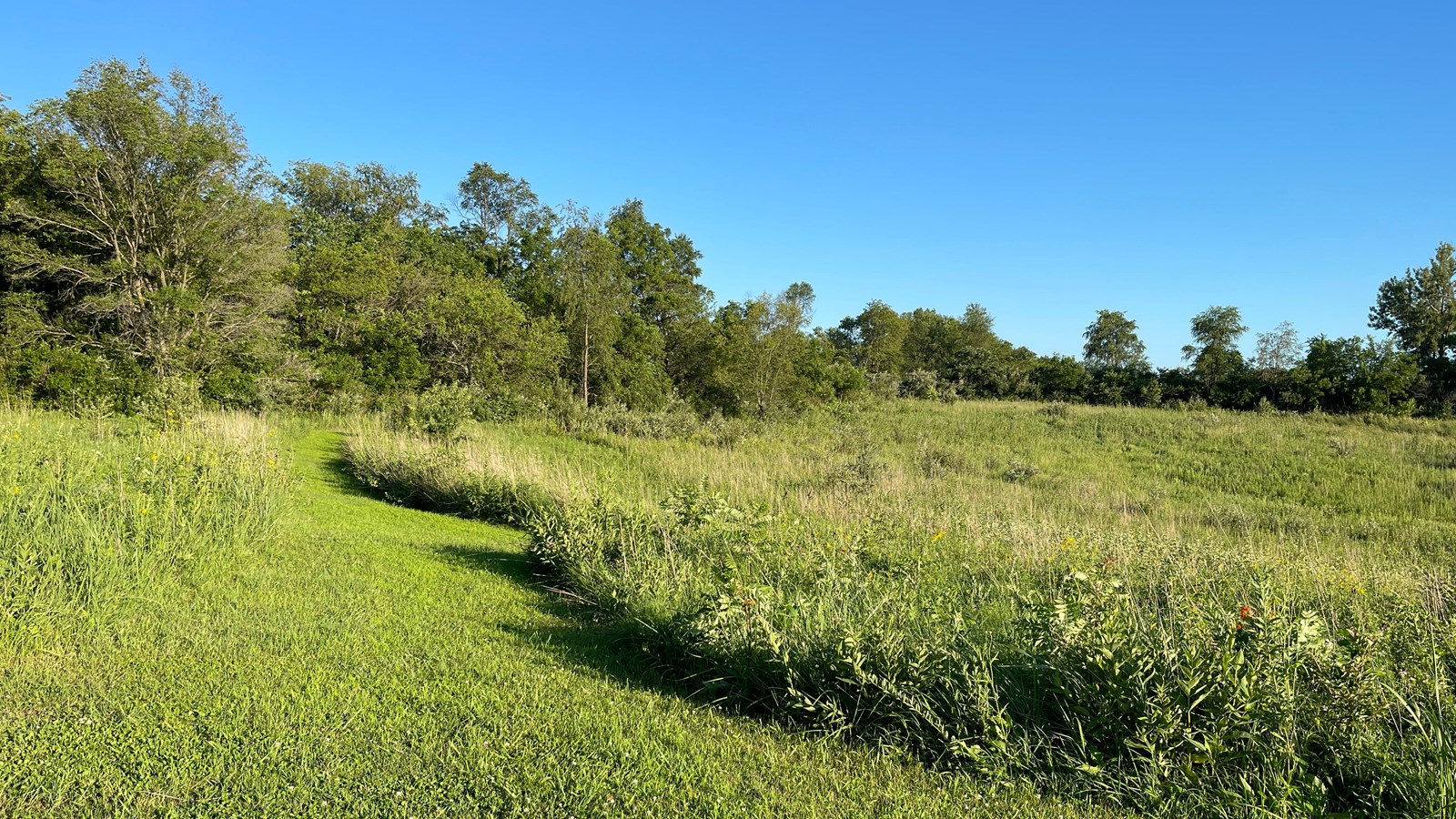Last updated: August 5, 2025
Place
Mormon Trail County Park and Pote Farm Swales

NPS Photo
Brigham Young’s 1846 advance party rolled northwesterly from Pisgah as the weather continued cold, wet, and windy. Despite the hardships they faced while crossing Iowa, some emigrants remarked in their journals on the beauty of the prairie. Newel Knight wrote on May 11, “The rich & variegated prairie looks as if nature had done her best to Cheer the weary & attract the admiration of the traveler while our Children amuse themselves with the sweet & beautiful flowers which grow spontaneous.”
A patch of native prairie, with a wayside exhibit describing the emigrant experience while crossing Iowa, can be viewed at Mormon Trail County Park, southeast of Bridgewater. Young’s company crossed this area on June 4, with others following over the coming weeks. Thousands of wagon wheels and hooves cut deep swales into the soft prairie soils, leaving scars—the Pote Farm Swales—that are still visible in a pasture southwest of the park.
On June 5, a few miles beyond the swales, Brigham Young’s wagons struck and followed an Indian trail across the Potawatomi Indian reserve. The tribesmen, in the process of being removed by the government to a new reserve in eastern Kansas, welcomed the emigrants. They expressed curiosity and sympathy toward these white people who, like themselves, had been evicted from their home country.
The following night, June 6, Young’s company circled its wagons for protection while camping on the south side of the West Nodaway River (in a field to the right of the junction of Victoria Road and 680th Street, Cass Co.), about 13 miles west of the Pote Farm Swales. However, the Potawatomi wished only to visit; they never threatened violence. The advance wagons moved on toward the Missouri River the following day.
Seventeen days later, on June 23, Hosea Stout’s small family and other latecomers reached this camp by the West Nodaway, where they settled in for nearly a week while waiting for floodwaters to recede. Stout and his wife Louisa (nursing her infant born two months earlier at Camp Creek) trembled from illness and hunger, and their three-year-old son, William Hosea, wheezed and fretted with whooping cough.
The second night in camp a violent storm tore down their tent, rain pounded in torrents, floodwaters lapped the wagon wheels, and all of the family’s belongings became soaked. Louisa found William Hosea lying in cold water, and the exposure aggravated his illness. The little boy grimaced, glared, writhed, and screamed in his torment, causing his father to worry that he was “troubled with evil spirits.” William Hosea lost his life on the morning of June 28. “Thus died my only son and one too on whom I had placed my own name and was truly the dearest object of my heart,” Stout grieved in his journal.
The wagons pulled out of camp later that morning and crossed the West Nodaway. Hosea and Louisa laid their child to rest on a nearby hillside beside the grave of another emigrant baby before continuing west with their remaining child.
Site Information
Location (2828 Delta Ave, Bridgewater, IA) Park is open; swales are on private land but may be viewed from public roadside.
No amenities are provided at Pote Farm Swales, not even historical information or a parking turnout. Visitors must park along the road shoulder. In the park are: benches/seating, boat ramp, campground, dock/pier, electrical hookup-boat/RV, Fish-cleaning station, historical/interpretive info/exhibits, Information – kiosk/bulletin board, parking -auto, parking-bus/RV parking -boat trailer, picnic table, playground, restrooms, showers, fishing jetties, restrooms, fish cleaning station, playgrounds, trails.
Safety Considerations
